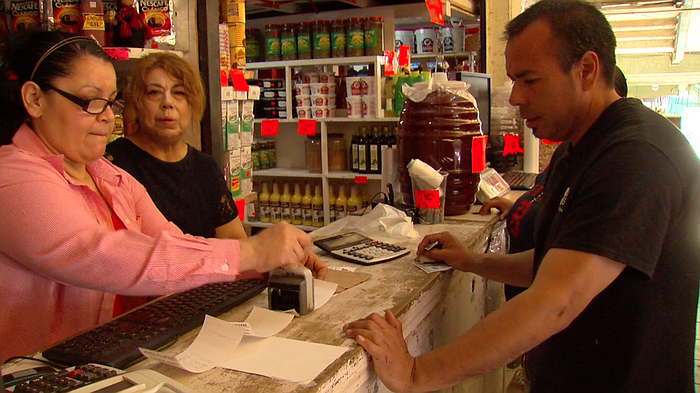Hugo Castro pulled a wad of $100 bills from his wallet and ordered hundreds of pounds of rice, oatmeal, oil, spaghetti and cleaning bleach at Tijuana’s main wholesale market.
“We are shopping, trying to maximize the money,” he said, wearing a black shirt emblazoned with a cross and the question, “Who Would Jesus Deport?”
As the heavy boxes and bags filled his two-door Toyota Solara, the car’s tires sank an inch or two. Castro inspected them with a grimace.
“Sometimes, they burst with the weight,” he said. “They just explode.”
Castro is leading a project called S.Owith food and other essentials. The San Diego nonprofit Border .S. Migrante Adopt a Shelter, which supplies 18 of Tijuana’s migrant shelters Angels collects donations and leads volunteers on supply drop-offs.
Tijuana has 38 shelters struggling to feed hundreds of migrants and refugees. Most are Haitians whom the U.S. started excluding from special humanitarian parole in September.
“They are trapped in Tijuana. For some of them, it’s like a limbo stage; for some, it’s a purgatory,» Castro said.
Castro hopped into the driver’s seat of his car and drove carefully to the first shelter, Mejor Herencia. Upon arrival, he was surprised to discover it was empty of migrants except one: Carlos Pierre, a 30-year-old Haitian.
Pierre, in a black tank top and donated women’s sneakers without shoelaces, explained to Castro that the shelter director had told the Haitians they could no longer stay in Mejor Herencia.
“The pastor said before that this was a shelter, but now he says, no, this is a church,” Pierre said.
He said he is waiting for an appointment with immigration authorities to acquire legal status in Mexico. For now, he can’t earn money except in informal jobs on the street, earning maybe 200 pesos a day, or about $10. After paying for food and bus fare, he has no money left over for rent – let alone to support his son in Haiti, his priority.
“We have brothers. Sisters. Children. Everything,” he said.
Like thousands of other Haitians, Pierre trekked through Latin America’s most dangerous countries to reach the U.S. border. The Haitians had moved to Brazil after the devastating 2010 earthquake and started a northbound journey last spring amid political and economic turmoil in the South American nation. At the time, the U.S. was letting Haitians in under humanitarian parole provisions.
Last fall, prompted by the influx of Haitians, the Department of Homeland Security announced a policy change: Haitians no longer qualified for special humanitarian parole. Haitians without status at the U.S. ports of entry would thenceforth be placed in detention centers and deported to Haiti.
“I spent more or less 4,000 dollars to get here,” Pierre said. “In Haiti, I have nothing anymore. That’s why I’m staying here in Tijuana. If I can’t live in the U.S., I’m going to fix my papers here.”
Castro of Border Angels paced back and forth in front of the shelter, unsure of what to do with the donations in his car.
“I think it’s so wrong what is going on right now, I just, I wasn’t aware,” he said, gesticulating. “I’m going to ask the assistant director what’s going on because –” Castro stopped as the shelter administrator, Hector Lozano, approached from down the street.
“Buenas, buenas, buenas tardes …”
Castro shook Lozano’s hand and said: “I’m very disconcerted because I don’t understand what’s happening. We brought donations to give to the migrants. But they’re telling us you guys are kicking them out.”
Lozano listened with a serious expression, nodding.
“If the pastor says (the Haitians) must evacuate at a certain date, then that’s it, period … What’s happening is that the national instruction is to evacuate the shelters. It’s the federal Mexican government asking that,” Lozano replied.
The Mexican government stopped funding the shelters in February, Lozano said. Between September and February, government support comprised about 30 percent of total food and other essentials received by the shelters. The rest came from advocacy groups like Border Angels. Now the shelters are wholly dependent on donations, Lozano said.
Castro became angry, telling Lozano that in his view, the Mexican government was acting like the new U.S. administration, with its hardline stance on immigration.
KPBS asked Mexico’s immigration institute, INAMI, about Lozano’s allegations. Mexico’s top immigration official for Baja California, Rodulfo Figueroa, said the Mexican government is offering Haitians the option to apply for temporary humanitarian status or permanent refugee status, which gives migrants the ability to work in Mexico. As a result, officials are advising migrant shelters to encourage Haitians to find jobs.
“There’s no longer a legal impediment for them to integrate into society,” Figueroa said.
Figueroa added that the Mexican state of Baja California has processed 651 applications for refugee status and 568 applications for temporary humanitarian status, mostly from Haitians. About 315 of the refugee applications and 485 of the humanitarian parole applications have been green-lighted.
“The shelters are free to do whatever they want, we don’t run the shelters, they can choose to ask people to leave or not,” Figueroa explained. “What we are telling them is that if somebody has acquired status, then they are no longer in our view subject to the aid through that mechanism.”
He said the government is still providing necessary support like health care for pregnant Haitian women.
After leaving Mejor Herencia, Castro distributed the donations in his car to various other migrant shelters that are still operating in downtown Tijuana.
One of the shelters was crowded with tents improvised from plastic bags.
“They prefer to be in these conditions than to be back in Haiti,” Castro said, pointing at the tents. “We are trying to improve the conditions of the shelters. That’s the reason we need all the help possible.”
Castro said the ultimate goal of S.O.S. Migrante Adopt A Shelter is to supply all 38 shelters in Tijuana and to expand to 12 shelters in Mexicali. He said volunteers from across California and parts of Arizona have participated in weekly drop-offs as well as donated through the Border Angels website.
He said the shelters can’t rely on Mexican or U.S. officials.
“I don’t believe in the (Mexican) leader. I don’t believe in the U.S. president,” Castro said. “But I do believe in the people. So we, the people, el pueblo, are the ones who are bringing the change.”







